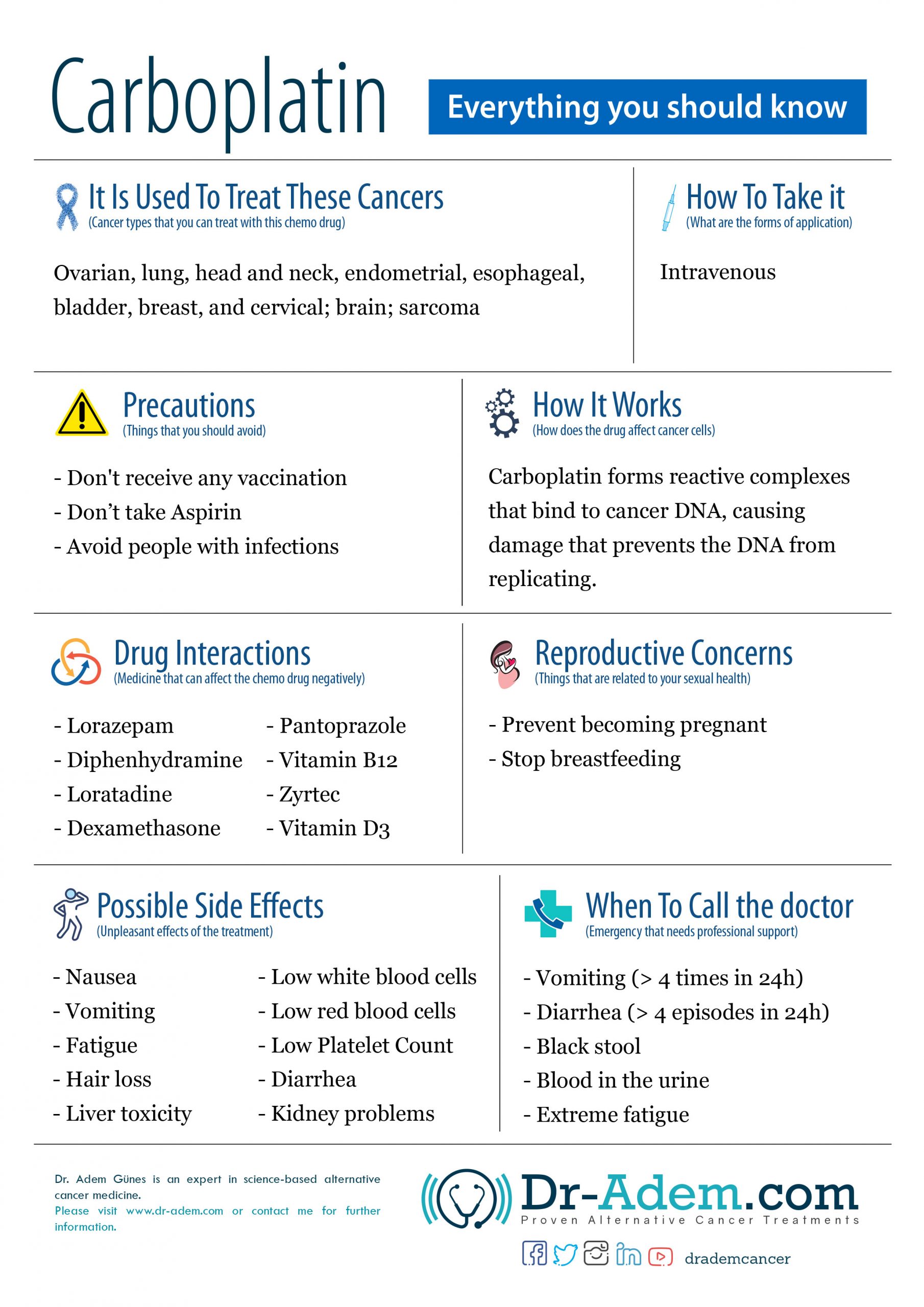Fact Sheet – Everything You Should Know
In this Carboplatin fact sheet, you’ll get to know about the precautions, usage, possible side effects, and the types of cancer that you can treat with this chemo drug.

Embed this Infographic on your site:
<a href='https://dr-adem.com/carboplatin-fact-sheet/'><img src='https://dr-adem.com/wp-content/uploads/2019/11/Carboplatin2-scaled.jpg' alt='Carboplatin Fact Sheet'/></a>Here’s the Carboplatin fact sheet to get detailed information about Carboplatin
It Is Used To Treat These Cancers
(Cancer types that you can treat with this chemo drug)
- Ovarian
- Lung
- Head and neck
- Endometrial
- Esophageal
- Bladder
- Breast
- Cervical
- Brain
- Sarcoma
How To Take it
(What are the forms of application)
- Exclusively intravenous
- Infusions usually take between 15-120 minutes
- Non-vesicant drug
Precautions
(Things that you should avoid)
- Don’t receive any vaccination
- Don’t take Aspirin
- Avoid people with infections
- Let your doctor know if you have known kidney problems
Mechanism of Action of Carboplatin
(How does the drug affect cancer cells)
Carboplatin belongs to the alkylating agents (Platine analogs subgroup) and is a cytostatic drug (causes cellular death or inhibits its growth). It forms complexes that bind to 2 neighboring guanine bases in the DNA, causing a stop into DNA replication, which results in the disruption of cellular metabolism.
Drug Interactions
(Medicine that can affect the chemo drug negatively)
- Lorazepam
- Diphenhydramine
- Loratadine
- Dexamethasone
- Pantoprazole
- Vitamin B12
- Zyrtec
- Vitamin D3
Reproductive Concerns
(Things that are related to your sexual health)
- Pregnancy prevention until 6 months after the treatment (men and women)
- Stop breastfeeding
- Consider sperm freezing if willing to bear children
Possible Side Effects
(Unpleasant effects of the treatment)
- Nausea
- Vomiting
- Hair loss
- Liver toxicity
- Low white blood cells: raise the risk of bacterial infection
- Low red blood cells: can lead to fatigue, general lack of interest and drive to be active
- Low platelets: can lead to bleeding (nose, gums) and in extreme cases to internal bleeding (intestinal, brain, joints)
- Diarrhea
- Kidney toxicity
- Nerve damage
- Hearing impairment
- Fatigue
- Infertility
When To Call the doctor
(Emergency that needs professional support)
- Vomiting (>4 times in 24h): can lead to severe dehydration and electrolyte disbalance
- Diarrhea (>4 episodes in 24h): can also lead to severe dehydration and electrolyte disbalance
- Black stool: can be a sign of intestinal bleeding
- Blood in the urine
- Extreme fatigue: can be a sign of severe anemia (low blood cells)
- Fever > 37,8°C


